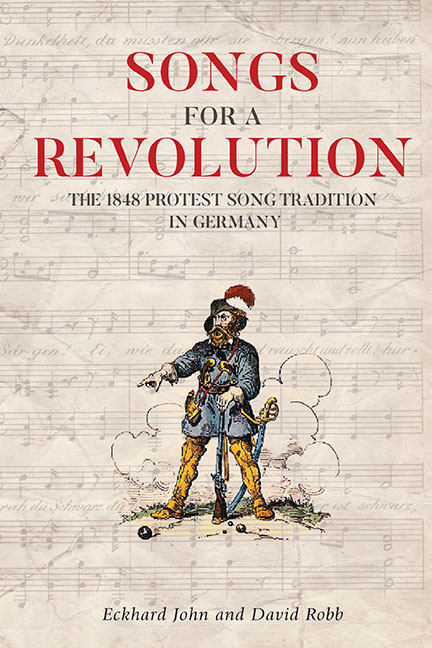Book contents
- Frontmatter
- Contents
- Preface
- Introduction: The Emergence of Political Song 1830–48
- Part I Before 1848: The Vormärz
- Part II 1848–49
- Part III 1848 in Memory
- Conclusion: The Making of Tradition; The Protest Songs of 1848 in the German Folk Revival 303
- Bibliography
- Discography
- Index of Names and Terms
- Index of Song Titles
8 - “Frisch auf, mein Volk, mit Trommelschlag” (“O wag’ es doch nur einen Tag”)
Published online by Cambridge University Press: 23 October 2020
- Frontmatter
- Contents
- Preface
- Introduction: The Emergence of Political Song 1830–48
- Part I Before 1848: The Vormärz
- Part II 1848–49
- Part III 1848 in Memory
- Conclusion: The Making of Tradition; The Protest Songs of 1848 in the German Folk Revival 303
- Bibliography
- Discography
- Index of Names and Terms
- Index of Song Titles
Summary
GEORG HERWEGH'S political poem “Frisch auf, mein Volk, mit Trommelschlag” (Rise Up, My People, with Beating Drums) was originally published in 1845 with the title “O wag’ es doch nur einen Tag” (Go On, Dare It Just for One Day). The text circulated to an extent in the year of the 1848 Revolution, but over the author's lifetime as a whole it received comparatively little attention. Clemens Zahn was the first to set it to an original melody in the late nineteenth century. After the First World War it was set to different melodies in songbooks of the workers movement in the Weimar Republic. In the socialist choirs of the GDR the song was nurtured as revolutionary heritage, but it met with little resonance in the Federal Republic. From the 1970s onwards, it was included in 1848 revolutionary songbooks, but was only seldom sung in the folk and Liedermacher scene.
The socialist Georg Herwegh (1817–75), one of the most prominent revolutionary poets of the Vormärz, had been living in exile since 1839, at first in Switzerland then, from 1843 onwards, in Paris. In 1841 he had made his name as a politically engaged writer with his collection Gedichte eines Lebendigen (Poems of a Living Person), a reputation that was to be cemented by the publication of its second volume in 1844. “O wag’ es doch nur einen Tag” was written in early January 1845 and was published as a broadside the same year.
Herwegh's poem calls on people to harness their desire for freedom and take the consequential next step to revolutionary action—in defiance of the political impotence that characterized the democratic movement of the time. With sarcastic undertones, the author dares the “Volk” (people) to be free “nur Einen Tag” (just for one day). A derisive tone, emphasized by the italicization of certain words, stems from a clear frustration on Herwegh's part. This is only partly concealed by a pathos reminiscent of the first volume of his Gedichte eines Lebendigen. With exaggerated idealism, the poet states that it is a question of honor to risk your life for a single “freien Atemzug” (free breath of air), in the same way that lovers would die for a “Schäferstunde” (a roll in the hay).
- Type
- Chapter
- Information
- Songs for a RevolutionThe 1848 Protest Song Tradition in Germany, pp. 117 - 128Publisher: Boydell & BrewerPrint publication year: 2020



